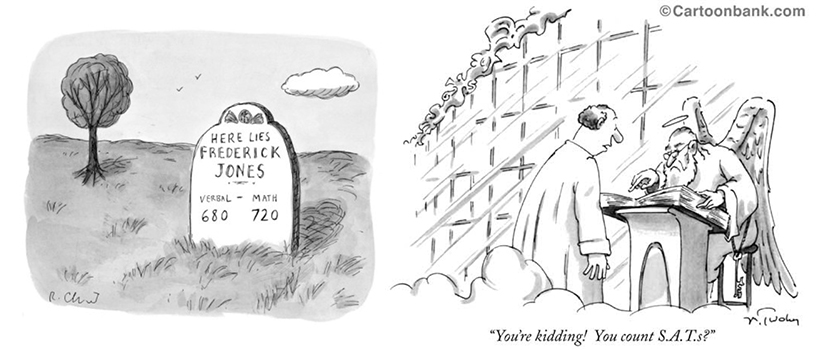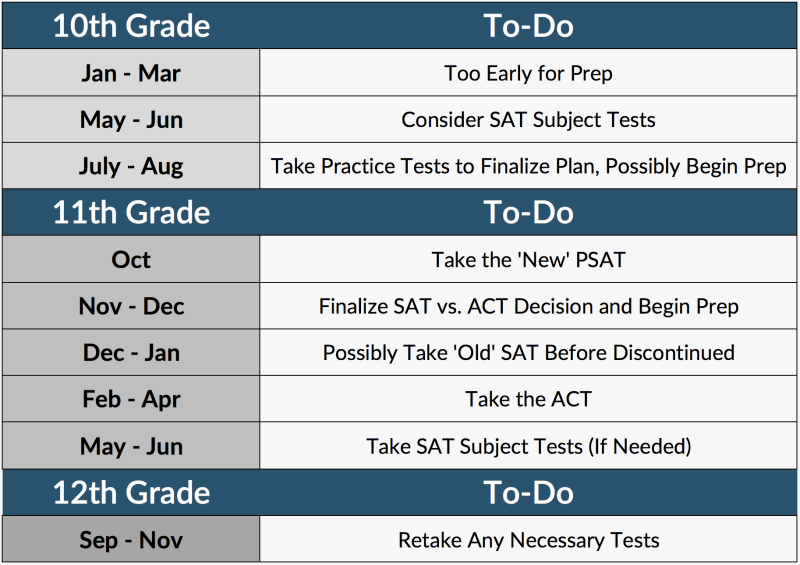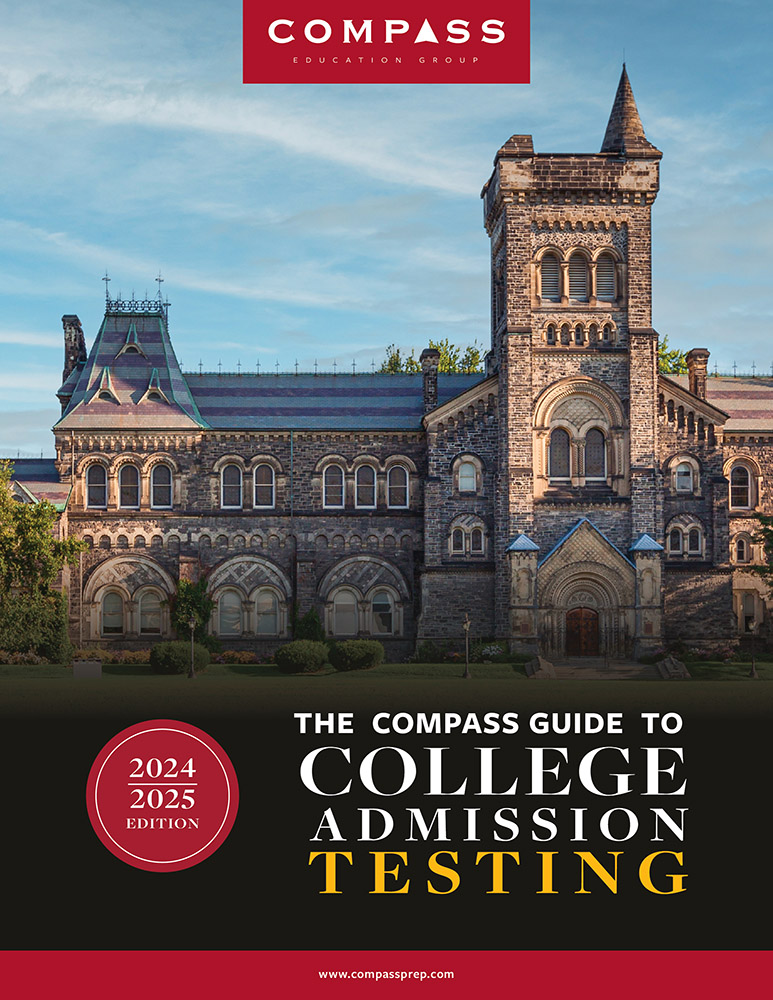
Many students in the class of 2017 are eagerly (or not-so-eagerly) awaiting the results of the PSAT they took in October. Even students at schools where the PSAT isn’t administered in 10th grade are still well aware of the looming gauntlet of standardized tests that students must run as they approach the college admission process. Anxiety around college admission is nearly unavoidable, and for many students it is the testing – PSAT, SAT, ACT, Subject Tests, AP’s – that causes the most stress.
While some degree of angst over testing is probably inevitable, at Compass we believe that the recipe for relief is clear: careful advance planning, thoughtful and well-balanced preparation, and a determination to maintain a healthy perspective. Yes, test scores matter. But not this much:

The stress relief starts with advance planning. For a student in the class of 2017, which tests should be taken and when? While individual circumstances should be accounted for and personalized advice from counselors should trump generalized advice, the following guidelines are a starting point from which to plot a customized path. To give you a basic summary of our recommendations for a testing timeline, I’ve included the table below:
Testing Timeline for the Class of 2017
 Winter/Spring of 10th Grade: Too Early for Test Prep
Winter/Spring of 10th Grade: Too Early for Test Prep
Resist the temptation to worry too much too early about tests. Instead, enjoy being a sophomore. Focus on your schoolwork. Engage intensely in non-academic passions. Cultivate friendships and your family relationships – in a few years you’ll probably be in new surroundings and living on your own. What not to do now? Test prep. Seriously. I own a test prep company, but I’m also a dad, I care about kids (sophomores are still kids), and I couldn’t be more sincere. It’s too early and it’s not necessary. You’ll be taking the SAT, not defending a dissertation. Preparation might entail several months of work (at most), but not several years. In fact, a good way to gauge the ethics of a test prep company or tutor is to call them in the middle of tenth grade and see if they’ll happily get you started right away on test prep. You’d have to twist Compass’ arm almost to the breaking point to get us to agree to actually begin tutoring you this early. We’re more than willing to consult with you and/or your parents, evaluate your 10th grade PSAT scores, possibly administer a practice test, and lay out a plan to commence many months from now, but that’s it. (All of the aforementioned is complimentary and offered without obligation, by the way.)
May/June of 10th Grade: Consider Subject Tests
SAT Subject Tests (formerly known as SAT II’s and even longer ago known as Achievement Tests) are relevant at a tiny fraction of the almost 3000 four-year institutions in the U.S. Approximately 40 colleges require or recommend Subject Tests, while about 60 will consider them if submitted. Many of these colleges, however, are extremely popular. As a general rule, if you believe you might apply to a very selective school, it is best to keep your options open and plan to take Subject Tests. They are designed to align with specific academic classes, so the ideal window to take a particular test is when you are completing the corresponding class in school. Most Subject Tests are taken at the end of 11th grade when students are in more advanced classes and are a year more mature academically and otherwise. However, 10th graders in an honors or AP class should consider taking the relevant Subject Test. A common pairing would be Pre-Calc Honors → Math 2. History and Science classes also may align. The Literature and Language tests are generally better deferred until after additional semesters of cumulative coursework. The takeaway is to consider scheduling practice tests in March or April for any Subject Tests you are considering taking officially in May or June. The practice tests are only one hour each, will help you determine whether or not you should take the actual test, and will reveal any gaps that you need to fill. Take the practice test at least one month before the official test date, so that you have time react to the results. Test prep for Subject Tests should be minimal and of a “polishing” nature; if not, then taking that test is probably ill-advised in the first place.
Summer Before 11th Grade: Take Practice Tests to Finalize Plan, Possibly Begin Prep
There is no black-and-white answer as to whether students should start test prep the summer before 11th grade. The trend is certainly in that direction, but for some students it’s simply premature. If you don’t feel ready – motivationally or otherwise – then holding off until later in 11th grade is fine. For most students, summer prep at this stage is foundational, meaning that we will not be on an unrealistic quest to have you defy the odds with a “one-and-done” performance in fall of 11th grade. That feat is rarely accomplished even by the National Merit Scholars on the PSAT, who are by definition in the 99th percentile of testers. So it’s really about giving you a big head start on the kind of work that will eventually lead to your peak performance later in spring of 11th grade or even fall of 12th grade, and lightening the load of what test prep might entail within the school year. These subtleties and individual goals are discussed thoroughly before we recommend a customized program for you. Any summer prep you choose to do should be scheduled in such a way as to not preclude other activities and travel.
A more universally appropriate testing event for rising 11th graders is diagnostic testing designed to finalize a testing plan for the coming school year. Practice test scores enable us to guide you towards a decision between the SAT and ACT, establish a baseline for prep, select specific test dates, and define appropriate parameters for the scope of your prep. For example, we will be the first to tell you if your scores in a particular area are high enough that little to no prep will be necessary. Conversely, if your scores are lopsided and a weakness in a particular area will require more time to address, we’ll explain that too. Bottom line is that by the summer of 11th grade (or fall at the latest), you should have a well-defined plan for what you will do in the 6-12 months ahead to ensure you reach your potential on these tests. That plan should be appropriately aggressive but should also strive for efficiency and a holistic balance of priorities. My favorite way of describing the ideal mindset is “I’ll give these tests their due, but not one second more.”
October of 11th Grade: Take the “New” PSAT
Unless you’ve been covering your ears every time anything related to standardized testing comes up, you’ve probably heard that the College Board is pushing through an extensive revamping of the SAT, led by their new President who is an architect of the Common Core and who is determined to return the SAT to its former glory (as of 2013, the ACT is more commonly taken nationally than the SAT). The class of 2017 has the rather dubious “honor” of being the guinea pigs for the new SAT, which officially debuts with the Oct 2015 PSAT. The reality is that most students will opt out of being guinea pigs and choose in spring 2016 to take the ACT instead, thereby avoiding the new SAT’s drawbacks in its debut year, which include a thin and compromised library of prep materials and delayed reporting of scores (all of which you can read more about here). However, even if you strongly suspect that you’ll take the safe route offered by the ACT, we still recommend that you take the 11th grade PSAT when offered by your school in Oct 2015. Reasons for doing so include a) you get the valuable experience of taking a standardized admissions test under real conditions, b) you’ll get a score that will be comparable to your 10th grade PSAT and a useful guidance tool for your counselors and other experts (us), and c) hey, you never know, maybe the new P/SAT’s idiosyncrasies will suit you so well that you’ll choose it over the ACT despite the compromises. Unlikely, but possible.
Fall/Winter of 11th Grade: Finalize SAT vs ACT Decision and Begin Prep
An unfortunate strategic error that we hear about all too commonly every year involves 11th graders starting prep for one test only to realize well into the process that prep for the other test would have been a better choice. At Compass we insist on pre-program diagnostic tests to minimize the risk of this happening to our students. A less common but much worse situation is when students fall victim to an unscrupulous test prep provider who intentionally steers them into concurrent or consecutive prep for both tests – a totally unnecessary overkill approach that is self-serving for the test prep company and typically harmful or at best inefficient for the student.
We’re also not fans of students taking their first SAT or ACT entirely cold as a “dry run.” The result is almost always a score that is useful as a baseline only and not a score that you will want to report to colleges. A practice test taken with Compass is a) professionally administered just like the real thing, b) accurately and promptly scored, c) without cost or obligation, d) all of the above. (We hate to just give away the answer, but it’s D.) As early as summer before 11th grade and no later than winter of 11th grade, take the necessary practice tests to accurately select the test that you will target officially. With this task completed, you will be ready to benefit fully from the deliberative, tried-and-true approach we profess.
January of 11th Grade: Possibly Consider Sitting for Final Administration of “Old” SAT
Students in the class of 2017 are in the rather quirky position of technically having more options (ACT, old SAT, new SAT) than the students a year before or after them while pragmatically having fewer options that are uncompromised. The new SAT is problematic for the reasons discussed above. The old SAT would be a perfectly good option as it has been for years, except for the fact that it will be offered for the last time in January 2016. We cannot in good faith recommend to most students an option that would unduly accelerate their timeline. The vast majority of students need at least the full sweep of 11th grade and quite often the fall of 12th grade before they are ready and able to peak on a college admission test. What would typify the student in the small minority for whom the old SAT would be worth a shot? That would be the rare student who did extremely well (National Merit level) on the 10th grade PSAT, confirms those results with an SAT practice test in summer 2015, prefers the format and content of the old SAT, and is available for potentially rigorous prep in fall of 11th grade. Students who choose the ACT will have nearly an additional full year of testing opportunities to peak.
February and/or April of 11th Grade: Take the ACT
The ACT will be the test of choice for most students in the class of 2017, and February or April of 11th grade (2016) will be the ideal window for their first sitting. February works well for students who got an early start on prep and/or are at the higher end of the score range, while April is ideal for students who will benefit from that many more months of academic maturation before their first official test. Both the February and April test dates leave the final 4-6 weeks of the school year open for students to focus more on Subject Tests, AP exams, and their academic classes. There is also an ACT offered the second Saturday in June for students who wish to retest.
May and/or June of 11th Grade: Take the Subject Tests (If Needed)
As discussed above in the context of the 10th grade year-end period, SAT Subject Tests are required, expected, or at least considered by approximately 100 colleges. It is critical to schedule Subject Tests when you are completing the corresponding class in school, so the end of the 11th grade year is the most popular and optimal time. We recommend scheduling practice tests in March or April for any Subject Tests you are considering taking officially in May or June. Considerable thought can go into which Subject Tests you select, when you take them (the timing of AP exams plays a role), whether you take them just once or utilize both the May and June dates, how many you take on any given date, and so on. The directors at Compass are experts at helping you think this through, and we aim to have our advice complement and expand upon the guidance you will likely receive from your counselors and teachers at school.
Fall of 12th Grade: Retake Any Tests As Necessary
ACT offers test dates in September, October, and December. The College Board fall dates are the first Saturdays in October, November, and December. Reporting of scores from fall test dates must be handled promptly and carefully by students applying to a college with early decision or early action, but otherwise the fall test dates are excellent opportunities for seniors to take the test a final time. While it is no longer common for students to wait until the summer before 12th grade to begin test prep, we still find many students who benefit from minimizing testing and test prep in 11th grade so as to focus more exclusively on schoolwork. As has been a theme in this post, these very individual decisions are well-informed by practice tests and in-depth consultations with a Compass expert.


Hello- to clarify – if you did not get a good score on an SAT II, do you have to report it? Thanks for your very helpful article(s)!
Hi Robin! Unless otherwise specified by a college’s admissions office, you are able to select which Subject Test scores to submit electronically (a practice known as ‘score choice’). If I was in your position, I would verify that the schools to which your student is applying do not require a record of ALL admission test scores (and thus, do not exercise score choice). I hope that helps!